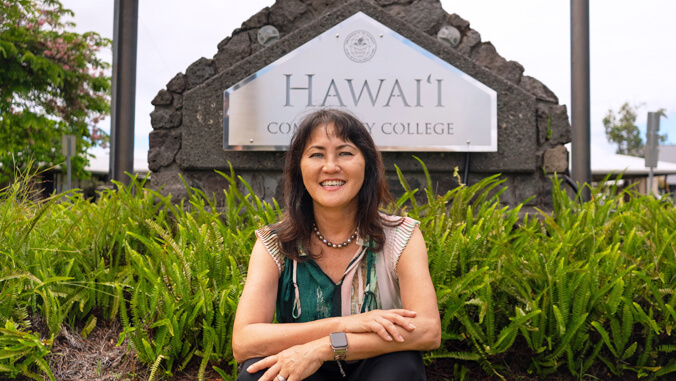
After 35 years working in higher education in Hawaiʻi—across five campuses statewide—Susan Kazama is calling Hawaiʻi Island home, again. Kazama, born and raised in Hilo and a member of the first graduating class of Waiākea High School, returned in July 2023 to serve as Hawaiʻi Community College’s interim chancellor.
On July 19, 2024, she took the helm officially. Among Kazama’s top priorities for the college are workforce development, student success, Indigenous values, sustainability and campus safety.
“The year I spent as interim chancellor gave me an invaluable opportunity to listen, learn and look for solutions,” said Kazama. “I was able to really view the campus through the lens of the students we serve by immersing myself as a student.”
Incorporating Native Hawaiian values

As interim chancellor, Kazama immediately joined classes with Hawaiʻi CC’s I Ola Hāloa Center for Hawaiʻi Lifestyles, which allowed her to learn protocol, leadership strategies, history and ʻōlelo (language). Noʻel Tagab-Cruz, coordinator for I Ola Hāloa Center for Hawaiʻi Life Styles, said Kazama was unafraid to jump in, but was cautious and aware of where to step.
“She has participated in numerous kīpaepae (a ceremony for the introduction and transition into new spaces). Susan continues to be supportive of our Haʻakūmalae Protocols program, which makes Hawaiʻi CC a leader in the UH systemʻs strategic initiative to transform into an Indigenous-serving institution,” Tagab-Cruz said.
Kazama said she would like more of the campus to understand how to incorporate Native Hawaiian values into the curriculum.
“I want us to be the premier Native Hawaiian-serving institution of choice for the island—a place where all of our students feel welcomed, valued and supported,” she said. “Seventy-eight percent of our Hawaiʻi CC students from the Big Island stay on island to live and work. We need to find ways to create opportunities for them to earn a living wage to afford the high costs here.”
Expanding opportunities

Hawaiʻi CC is a unique part of the UH System, Kazama said. “We have three sites across the island, as well as online classes, which makes learning much more accessible to our students. Not only that, but we have several educational opportunities like a hula certificate, agroforestry and our apprenticeship and non-credit programs found nowhere else.”
She aims to expand apprenticeship and internship opportunities for students through community organizations. Kazama would like to include more Early College and dual enrollment pathways for career technical education where high school students can earn a college credential before they graduate from high school, giving them a step up into employment.
Hawaiʻi CC’s agricultural program’s partnership with The Food Basket (Hawaiʻi Island’s Food Bank) creates an “amazing” opportunity to build sustainability for the college and the community, according to Kazama.
She said,“It’s important that we teach our young people how to feed themselves and their families. Our new 15 acres of additional land is going to be really big for this cause.”
Library studies

Kazama earned a bachelor’s degree in psychology as well as a master’s in library studies from UH Mānoa. She started with UH in 1987 as a librarian at UH Maui College then at Honolulu CC. She spent 12 years at UH Mānoa’s Hamilton Library before accepting the library director position at Kapiʻolani CC in 2001. She served as interim vice chancellor for academic affairs at Kapiʻolani CC and Honolulu CC until 2021, when she became a program coordinator for continuing education at Kapiʻolani CC.
She said her background as a librarian lends itself to leading a college campus, and decades of work on Maui, Oʻahu and now Hawaiʻi Island have given her a large network of relationships and resources to draw on.
“Librarians are organized, detail-oriented, budget-conscious and collaborative,” Kazama said. “We like beauty and order, but above all, we are solution driven, and we usually know where to look for answers.”
—By Katie Young Yamanaka

